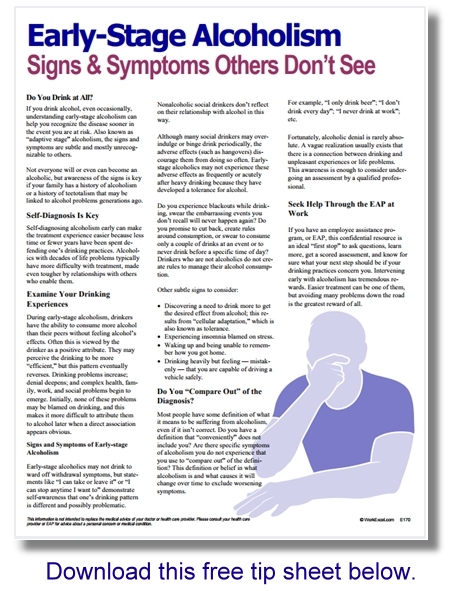- Home
- Early Stage Alcoholism - Signs and Symptoms Others Don't See
Early Stage Alcoholism - Signs and Symptoms Others Don't See
Early Stage Alcoholism - Signs and Symptoms Others Don't See
Download tip sheet at the bottom of this page.
Early-Stage Alcoholism — Signs and Symptoms Others Don't See
If you drink alcohol, even occasionally, understanding early-stage alcoholism can help you recognize the disease sooner in the event you are at risk.
Also known as “adaptive stage” alcoholism, the signs and symptoms are subtle and mostly unrecognizable to others.
Not everyone will or even can become an alcoholic, but awareness of the signs is key if your family has a history of alcoholism or a history of "teetotalism" that may be linked to alcohol problems generations ago.
Self-Diagnosis Is Key
Self-diagnosing alcoholism early can make the treatment experience easier because less time or fewer years have been spent defending one’s drinking practices. Alcoholics with decades of life problems typically have more difficulty with treatment, made even tougher by relationships with others who have enabled them for years.
Examine Your Drinking Experiences
During early-stage alcoholism, drinkers have the ability to consume more alcohol than their peers without feeling alcohol’s effects. Often this is viewed by the drinker as a positive attribute. They may perceive the drinking to be more “efficient,” but this pattern eventually reverses. Drinking problems increase; denial deepens; and complex health, family, work, and social problems begin to emerge. Initially, none of these problems may be blamed on drinking, and this makes it more difficult to attribute them to alcohol later when a direct association appears obvious.
Signs and Symptoms of Early-Stage Alcoholism
Early-stage alcoholics may not drink to ward off withdrawal symptoms, but statements like “I can take or leave it” or “I can stop anytime I want to” demonstrate self-awareness that one’s drinking pattern is different and possibly problematic. Nonalcoholic social drinkers don’t reflect on their relationship with alcohol in this way.
Although many social drinkers may overindulge or binge drink periodically, the adverse effects (such as hangovers) discourage them from doing so often. Early-stage alcoholics may not experience these adverse effects as frequently or acutely after heavy drinking because they have developed a tolerance for alcohol.
Do you experience blackouts while drinking and swear the embarrassing events you don’t recall will never happen again? Do you promise to cut back, create rules around consumption, or swear to consume only a couple of drinks at an event or to never drink before a specific time of day? Drinkers who are not alcoholics do not create rules to manage their alcohol consumption in this way.
Other subtle signs to consider:
- Discovering a need to drink more to get the desired effect from alcohol; this results from something called “cellular adaptation,” which is also known as tolerance
- Experiencing insomnia blamed on stress
- Waking up and being unable to remember how you got home
- Drinking heavily but feeling — mistakenly — that you are capable of driving a vehicle safely
Do You "Compare Out" of the Diagnosis
Most people have some definition of what it means to be suffering from alcoholism, even if it isn’t correct. Do you have a definition that “conveniently” does not include you? Are there specific symptoms of alcoholism you do not experience that you use to “compare out” of the definition? This definition or belief in what alcoholism is and what causes it will change over time to exclude worsening symptoms. For example, "I only drink beer"; "I don’t drink every day"; "I never drink at work"; etc.
Fortunately, alcoholic denial is rarely absolute. A vague realization usually exists that there is a connection between drinking and unpleasant experiences or life problems. This awareness is enough to consider undergoing an assessment by a qualified professional.
Seek Help Through the EAP at Work
If you have an employee assistance program, or EAP, this confidential resource is an ideal “first stop” to ask questions, learn more, get a scored assessment, and know for sure what your next step should be if your drinking practices concern you. Intervening early with alcoholism has tremendous rewards. Easier treatment can be one of them, but avoiding many problems down the road is the greatest reward of all. DOWNLOAD THIS REPRODUCIBLE TIP SHEET
DOWNLOAD THIS REPRODUCIBLE TIP SHEET
PDF ONLY
MS Publisher, MS Word with Images, PDF
Catalog of Tip Sheets
Full WorkExcel.com Catalog
__________________________________
View this tip sheet in media format below, then purchase it as a PowerPoint, Web Video, or Web course HERE .
- DOT Reasonable Suspicion Training Program Required for Supervisor of Safety/Sensitive Positions
- Non-DOT Reasonable Suspicion Training Program for Supervisors
- Employee Version of Alcohol and Drug Awareness Training
 Loading... Please wait...
Loading... Please wait...

